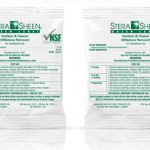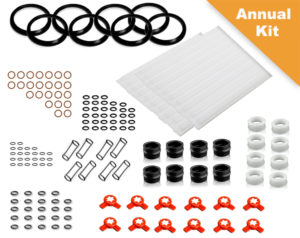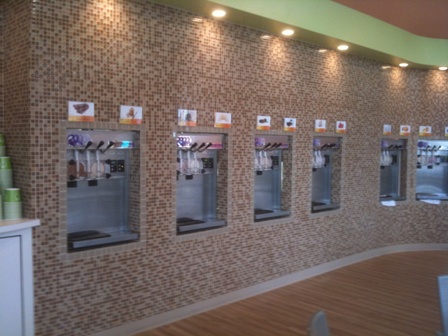Frozen yogurt shops are one of the hottest retail concepts around. Many people see how simple the concept is, the low investment cost, and the high margins and think it is a no brainer. They expect to open their shop and start turning an amazing profit right away. But it’s not quite that simple. Check out the profit calculator on our website for a customized analysis for your concept.
There are several key drivers to making a profit with a frozen yogurt store. It is important to emphasize profit versus sales. You may have lots of sales, but if your costs are too high you won’t make any profit. You should think of these profit drivers as dials or levers – you can adjust the dials various ways to maximize profit.
Key Profit Drivers
Sales Revenue
- Volume – the number of customers per day and the number of ounces of yogurt sold
- Price per ounce
- Sales of additional items (non yogurt items)
Costs
- Labor costs
- Rent & utilities
- Product costs (yogurt mix, flavorings, toppings, etc.) – don’t forget to include the cost of free samples
- Supplies (cups, spoons, napkins, etc.)
- Store and equipment maintenance
Turning the Dials
Increase Sales Revenue
- Get more customers. Typically this will mean more costs (like advertising and marketing), but it you can also be creative and find traffic generating ideas with no or little cost. Another way to drive more traffic is to improve your product by offering new or unique flavors and by creating a unique product compared to your competitors. Nanci’s mixes and flavors are ideally suited for this – contact us to discuss further.

- Increase the price. You can increase price and often not affect sales volume, but this is tricky because thereis an elusive price Tipping Point. When you cross it your volume will actually decrease because either customers will stop coming or they will buy less. This Tipping Point is unique to every area and every store. One approach is to keep your base price per ounce high but then use discounts and promotions to give customers a lower effective price. Remember that it is much easier to lower your price than it is to raise it.
Lower Costs
When evaluating costs there are Fixed Costs and Variable Costs. Fixed Costs are costs that are the same  regardless of how many customers you serve. For example, your rent cost will be the same whether you serve 10 customers or 300. Rent is a fixed cost. On the other hand, cups are a variable cost because you only incur costs for each customer.
regardless of how many customers you serve. For example, your rent cost will be the same whether you serve 10 customers or 300. Rent is a fixed cost. On the other hand, cups are a variable cost because you only incur costs for each customer.
- Rent. One of the largest single costs for your store will be rent. There are a couple strategies to take when deciding on a location. For the purposes of simplicity, we’ll break it down into two strategies at opposite ends of the spectrum, even though in reality there are various strategies in between these two.
High Rent/High Volume. If the location is high rent it needs to also be a high traffic area to drive your sales volume. High rent areas may also allow you to charge more per ounce. In order for this strategy to work, you must have a large number of customers.
Low Rent/Low Volume/Low Cost. If the location is a very low rent property that means it’s probably off the beaten path and doesn’t have as much natural traffic. Generally, this would result in less traffic and lower sales volume, although there are stores that are in horrible locations and still gain a “cult following” and have lots of traffic. A low rent location may also mean you need to charge less per ounce, lowering your sales revenue. In order for this strategy to work you have to keep your costs extremely low and find ways to generate traffic in spite of your location.
- Labor. Labor will most likely be your single highest cost. The big question here is whether or not you can run your store with just one employee. Our profit model shows that unless your store has strong volume (150 customers per day or more), you could lose money having two employees staff your shop. Of Course there are other factors to consider, like employee safety and or employee fraud.
- Product Costs. this is also a tricky area, because your entire concept is based on your frozen yogurt mix. If you mix isn’t good, you won’t succeed. But at the same time, you shouldn’t throw money away on an overpriced product. Nanci’s solves this issue with mixes that are high-quality, premium mixes, but at a very competitive price.
- Samples. most likely, the customers will demand free samples, but at the very least you should understand how many free samples you are giving away and how it is affecting your costs. One option is to have the sample cups behind the counter so the customer has to request one from an employee. Studies show that when shoppers make eye contact with a store employee they are less likely to steal something – I’d like to think this principal holds true for abusing the free samples as well.
The general belief in the business world, is that you don’t really make a substantial profit on food retail shops until you own three or more. Depending on your available capital, you may want to consider opening 2 or 3 shops at the same time. This will also give you immediate brand relevance and can often protect your area from incoming competitors.
Don’t forget to check out the profit calculator and feel free to call 1-800-788-0808 or email info@nancis.com with any questions.











 The customers pay for exactly what they get.
The customers pay for exactly what they get.
 FroCup.com
FroCup.com